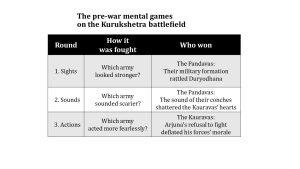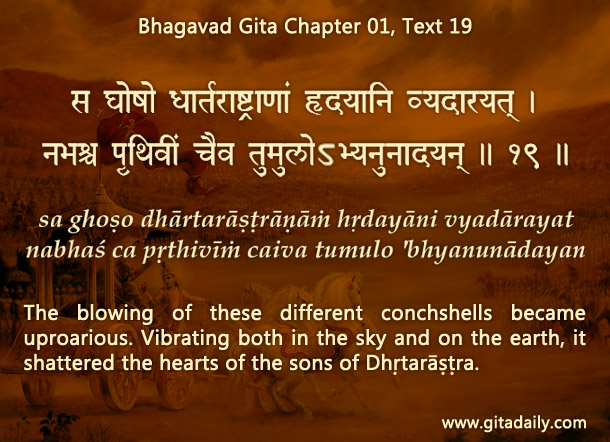 War is not just a physical conflict between two armies; it is also a mental conflict between the fighting spirit of the two armies. And the winner of the mental conflict gains a significant upper hand in the war.
War is not just a physical conflict between two armies; it is also a mental conflict between the fighting spirit of the two armies. And the winner of the mental conflict gains a significant upper hand in the war.
No wonder wars are frequently accompanied by mental games, wherein each side tries to demoralize the other by aggressive displays of strength. The Bhagavad-gita’s first chapter (01.02-19) describes how the Pandavas won the first two rounds of the mental war. Round 1 was based on sights: which army looked stronger? Because the Kauravas had a bigger army, their leader Duryodhana had thought he would easily win this round. But the Pandavas had arranged their army in such a formidable formation that he was rattled (01.02). Round 1 winner? The Pandavas
Round 2 was based on sounds: which side sounded stronger? Blowing conches was a traditional declaration both of one’s intent to fight and of the start of the fight. Though warriors from both sides blew their conches (01.12-18), the sound of the Pandava conches was so thunderous that it shattered the Kauravas’ morale (01.19). Round 2 winner? The Pandavas.
Given such a positive buildup, Arjuna’s refusal to fight would have not just dampened his army’s rising spirit, but also deflated it completely. Their fate would be like that of a boxer defeated by a sudden knock-out blow in the third round after winning the first two rounds. The very fact that Arjuna inflicted such a mental knock-out on his own army through his actions conveys how overwhelming and immobilizing his agony was. When we thus appreciate the magnitude of Arjuna’s mental distress, we become far more interested in the answer to the question: What did the Gita teach that freed Arjuna from such inner torment?
One-sentence summary:
After the Pandavas had won the first two rounds of the pre-war mental games, Arjuna’s reluctance to fight was like a self-inflicted knock-out defeat — when we thus understand the magnitude of Arjuna’s mental distress, our interest increases manifold to know how the Gita restored his morale.
Think it over:
- In the pre-war mental games, how did the Pandavas win the first two rounds?
- In those mental games, what was the effect of Arjuna’s reluctance to fight? Why?
- How does understanding the significance of Arjuna’s actions reshape our view of the Gita?
***
01.19: The blowing of these different conchshells became uproarious. Vibrating both in the sky and on the earth, it shattered the hearts of the sons of Dhritarashtra.
To know more about this verse, please click on the image


The conch shells of JAPA always blows loudest
Eloquent!